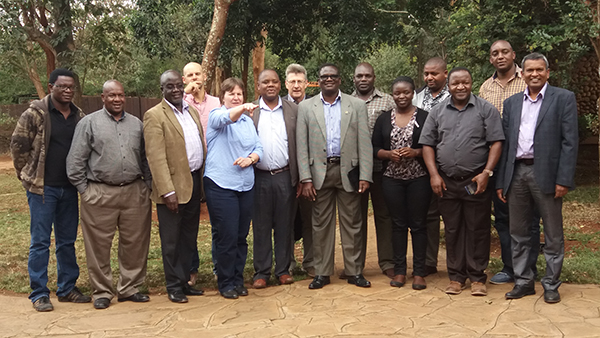RVC researchers celebrate progress made in eradicating the deadly peste des petits ruminants (PPR) virus
Researchers from the Royal Veterinary College (RVC) are celebrating the progress that has been made in eradicating the deadly peste des petits ruminants (PPR) disease globally. The key findings shed light on the prevalence of antibodies, the range of hosts for the virus and the interaction between wildlife and habitat systems.

PPRV, known also as the cause of ‘goat plague’, is a severe gastrointestinal and respiratory disease in sheep, goats and a range of wildlife species. Non-immune or susceptible herds experience up to 90% mortality. It occurs in more than 70 countries, with recent outbreaks in Bulgaria, Central Asia, the Middle East and East Africa. It can have a devastating economic impact on small ruminant farmers in Asia and Africa and is of considerable biodiversity conservation concern. Furthermore, its societal impact disproportionately affects women.
The World Organisation for Animal Health (OIE) and The Food and Agriculture Organization of the United Nations has set the goal of eradicating the disease by 2030. Understanding the role of wildlife is essential to protect vulnerable wildlife from livestock disease, as well as avoid undetected vectoring of the virus, and thus ensuring no persistence in wildlife infection complicates the vaccine implementation in livestock.
The virus persistence in wildlife or atypical livestock populations could lead to reinfection of susceptible sheep and goats, which maintain the virus, reducing the impact of both international and national investment. In response to this burgeoning threat, researchers from the RVC used wildlife and atypical domestic hosts for PPR surveillance to identify where the virus is endemic.
RVC researchers are working with a range of partners globally such as the Pirbright Institute, CIRAD France, University of Glasgow, the Friedrich Loeffler Institute, the Swedish University of Agricultural Sciences, Southern African Centre for Infectious Diseases SACIDs Tanzania, Tanzania Wildlife Research Institute, the Kenya Wildlife Services, Uganda Wildlife Authority, Veterinary Services in Uganda, Kenya, Sudan, Tanzania, Kazakhstan Biosafety Institute and Veterinary Reference Labs, Mongolia Vet Labs and services and Wildlife Conservation Society Mongolia, FAO GEP and Global Research Network.
RVC’s research has led to many important discoveries, including:
- identifying a wide host range for the virus in African buffalo, antelope species and wild suids across East Africa but where the populations are resilient and infection is subclinically contrasting with confirming PPR disease in black-tailed gazelle, Sibirien ibex and saiga antelope in Mongolia in Asia
- determining estimated and true PPR virus antibody prevalence statistic for certain species in specific ecosystems
- establishing evidence for spill over of the virus from small domestic ruminants to wildlife and the habit characteristics which can cause this spill over, as well as likely outcomes in free-ranging populations in Africa and some in Asia.
- confirming the nature and patterns of disease in small livestock in East Africa including clarifying differential diagnostics and showing endemicity across many parts of the region in both savannah and forested ecosystems.
- Providing important science for determining eradication policy and methods for surveillance and monitoring the disease as well as improved diagnostic protocols with novel serological tests being validated against collected positive and negative serum for PPR virus antibody.
The RVC will continue its vital work in understanding, tracking and eradicating PPR, thereby preventing the negative disease impacts on poorer livestock communities and biodiversity.
Richard Kock, Chair in Wildlife Health and Emerging Diseases at the Pathobiology and Population Sciences Department at the RVC, said:
“I worked with colleagues and partners through the latter two decades of the twentieth century to successfully eradicate rinderpest virus from the earth, with massive benefits to domestic livestock, poor people and wildlife conservation in Africa and Asia. When I became Professor of Wildlife Health and Emerging Diseases at the RVC in 2011, I took up the challenge of continuing to support morbillivirus research on equally devastating diseases, establishing a group to work on PPR virus, in wildlife and atypical hosts globally, with a focus on livestock disease in East Africa and Central Asia at the interface with wildlife. “The PPR virus has now become the focus of the international community for the elimination of the second animal virus of economic and environmental significance by 2030 and our work has been fundamental in establishing the new global research network and strategy for this process.”
Notes to Editors
For more information please contact:
- Jasmin De Vivo (Jasmin.DeVivo@plmr.co.uk or rvc@plmr.co.uk
- Press Line: 0800 368 9520
About the RVC
- The Royal Veterinary College (RVC) is the UK's largest and longest established independent veterinary school and is a Member Institution of the University of London. It was the first in the world to hold full accreditation from AVMA, EAEVE, RCVS and AVBC.
- The RVC is ranked as the top veterinary school in the world in line with the QS World University Rankings by subject, 2021.
- The RVC offers undergraduate and postgraduate programmes in veterinary medicine, veterinary nursing and biological sciences.
- In 2017, the RVC received a Gold award from the Teaching Excellence Framework (TEF) – the highest rating a university can receive.
- A research led institution with 79% of its research rated as internationally excellent or world class in the Research Excellence Framework 2014.
- The RVC provides animal owners and the veterinary profession with access to expert veterinary care and advice through its teaching hospitals and first opinion practices in London and Hertfordshire.

